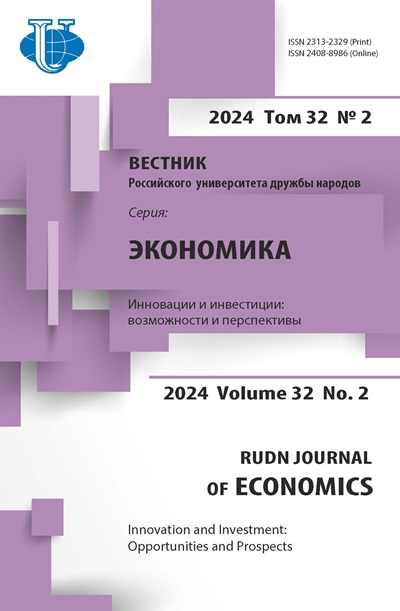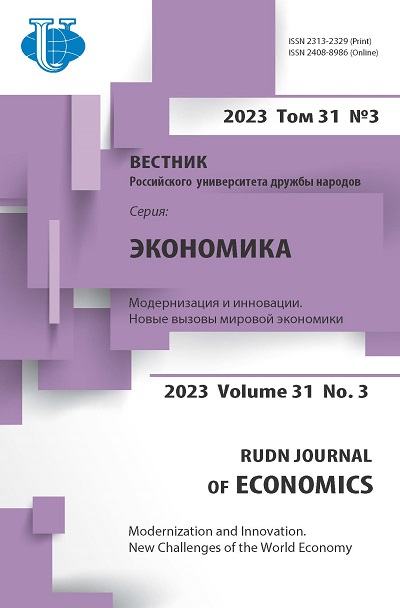Historical review of the Russian market economy formation and development based on the works of Doctor of Economics, Prof. L.S. Shakhovskaya
- Authors: Popkova E.G.1
-
Affiliations:
- RUDN University
- Issue: Vol 31, No 3 (2023): MODERNIZATION AND INNOVATION. NEW CHALLENGES OF THE WORLD ECONOMY
- Pages: 385-399
- Section: EDITORIAL ARTICLE
- URL: https://journals.rudn.ru/economics/article/view/36223
- DOI: https://doi.org/10.22363/2313-2329-2023-31-3-385-399
- EDN: https://elibrary.ru/QRTPPP
Cite item
Full Text
Abstract
Research focuses on the problem of incompleteness and unreliability of the existing scientific vision of the formation and development of a market economy in Russia. In the current vision, the boundaries of the stages of formation and development of a market economy in Russia are blurred, the transition to a market path of economic development has an ambiguous interpretation in the scientific literature and is mainly associated with the 1990s. The lack of a clear understanding of the essence, sequence and continuity of the stages of formation and development of a market economy in Russia causes the uncertainty of the current stage of this process. The purpose of this research is to develop a systematic scientific vision of the process of evolution of a market economy in Russia. The study provides a historical review of the formation and development of a market economy in Russia based on the works of Doctor of Economics, prof. L.S. Shakhovskaya, who stood at the origins of the formation of the scientific concept of the market economy of Russia and in her works reflected in detail the essence and features of each stage of its evolution. This article is dedicated to the 80th anniversary of Professor L.S. Shakhovskaya, was written by her students who are developing the scientific school founded by her. The proposed new scientific vision of the process of evolution of the market economy in Russia, which clearly determined the three stages of its evolution. The first stage (1991-1999) was associated with the transition from a planned to an open industrial market economy through privatization and deregulation. The second stage: (2000-2013) was the integration of Russia into the world economic system to form an open post-industrial market economy. The third (modern) stage (2014-2031) involves the strengthening of strategic academic and technological leadership for the transition to a neo-industrial market economy 4.0 through ensuring technological sovereignty. Research contributes to the development of scientific and economic thought through the formation of a systematic scientific vision of the process of evolution of the market economy in Russia, which rethought and clarified the history of the market economy in Russia, and also clarified the meaning of its current stage by reflecting its continuity and patterns of occurrence. The scientific novelty of the system vision is that it proved for the first time that the transition period is a whole set of periods involving the transformation of market relations with various targets and management measures.
About the authors
Elena G. Popkova
RUDN University
Author for correspondence.
Email: elenapopkova@yahoo.com
ORCID iD: 0000-0003-2136-2767
Doctor of Economics, Professor of International Economic Relations Department, Faculty of Economics
6 Miklukho-Maklaya St, Moscow, 117198, Russian FederationReferences
- Aganbegyan, A.G. (2022). The Two Main Macroeconomic Theories of Keynes and Friedman and Their Use in the Economic Policy of the World’s Major Countries and Russia. Stud. Russ. Econ. Dev, (33), 471–479. https://doi.org/10.1134/S1075700722050021
- Amri, P.D., Chiu, E.M.P., Meyer, J.M., Richey, G.M., & Willett, T.D. (2022). Correlates of Crisis Induced Credit Market Discipline: The Roles of Democracy, Veto Players, and Government Turnover. Open Econ Rev, 33, 61–87. https://doi.org/10.1007/s11079-021-09630-w
- Artemyev, A.A., Sidorova, E.Yu., & Lasloom, N. (2023). Methodological problems of determining the customs value based on the real economic meaning of transnational companies’ operations. RUDN Journal of Economics, 31(1), 159–169. https://doi.org/10.22363/23132329-2023-31-1-159-169
- Belyanova, E.V., Egorov, A., & Bashirova, I. (2022). “Russian economic barometer”: the experience of studying market reforms in Russia. World economy and international relations, 66(2), 132–138. https://doi.org/10.20542/0131-2227-2022-66-2-132-138
- Bikmaeva, A.D. (2023). Dynamics of the structure of the economy of the Russian Federation: from the beginning of market reforms to the present. Economics and Management: Scientific and Practical Journal, 1(169), 14–19. https://doi.org/10.34773/EU.2023.1.2
- Davydov, V.M. (2021). Imperatives of Sustainable Development in the Shadow and in the Light of the Pandemic. Mirovaya ekonomika i mezhdunarodnye otnosheniya, 65(3), 11–22. https://doi.org/10.20542/0131-2227-2021-65-3-11-22
- Digilina, O.B., Teslenko, I.B., & Nalbandyan, A.A. (2023). The artificial intelligence: Prospects for development and problems of humanization. RUDN Journal of Economics, 31(1), 170–183. https://doi.org/10.22363/2313-2329-2023-31-1-170-183
- Gerten, C., Boyko, D., & Fina, S. (2022). Patterns of Post-socialist Urban Development in Russia and Germany. Front. Sustain. Cities, 4, 846956. https://doi.org/10.3389/frsc.2022.846956
- Gogokhia, T., & Berulava, G. (2021). Business environment reforms, innovation and firm productivity in transition economies. Eurasian Bus Rev, 11, 221–245. https://doi.org/10.1007/ s40821-020-00167-5
- Ji, Y. (2023). Shock Therapy in Transition Countries: A Behavioral Macroeconomic Approach. Comp Econ Stud. https://doi.org/10.1057/s41294-023-00211-z
- Koltsov, V.V. (2012). Twenty years of market reforms in the economy of modern Russia: a year of “shock therapy”. Collection of scientific papers SWorld, 19(1), 91–94.
- Kolomak, E.A. (2022). The Contradictory Impacts of Inhomogeneous Market Potential on the Development of Russian Cities and Towns. Reg. Res. Russ, 12, 261–270. https://doi.org/10.1134/S2079970522700083
- Kornilov, G. (2022). Russian Modernization in the 20th Century: Features, Pace, and Results. Herald of the Russian Academy of Sciences, 92 (Suppl 3), S221–S234. https://doi.org/10.1134/S1019331622090088
- Kovalevskaya, Yu.N. (2021). Possibilities of various methodological approaches for scientific criticism of the results of market reforms in Russia and the Far Eastern Federal District. Proceedings of the Institute of History, Archeology and Ethnography of the Far Eastern Branch of the Russian Academy of Sciences, 33, 10–24. https://doi.org/10.24412/26585960-2021-33-10-24
- Lebedev, V.V. (2015). Analysis of market reforms in Russia. World of Changes, 4, 177–180.
- Malkhozova, F.V. (2022). The Fight for Economic Reform in Russia, 1990–1991. Herald of the Russian Academy of Sciences, 92 (Suppl 1), S70–S89. https://doi.org/10.1134/S1019331622070073
- Mamakhatov, T.M., & Mallah, Ja.M. (2022). The influence of the digitalization factor on the formation and development of human capital in developing countries. RUDN Journal of Economics, 30(3), 317–328. https://doi.org/10.22363/2313-2329-2022-30-3-317-328
- Popkova, E.G., Shakhovskaya, L.S., Romanova, M.K., & Dubova, Y.I. (2013). Bases of transition of the territory to sustainable development: Modern city. World Applied Sciences Journal, 23(11), 1499–1507. https://doi.org/10.5829/idosi.wasj.2013.23.11.13167
- Popkova, E.G., Bogoviz, A.V., & Sergi, B.S. (2021). Towards digital society management and ‘capitalism 4.0’ in contemporary Russia. Humanities and Social Sciences Communications, 8(1). https://doi.org/10.1057/s41599-021-00743-8
- Shakhovskaya, L.S. (1995). Motivation of labor in a transitional economy: monograph. VolgGTU. Volgograd: Publishing house of VGPU “Change”.
- Shakhovskoy, L.S. (Ed.). (2000). Actual problems of reforming the Russian economy: theory, practice, perspective. Volgograd: Polytechnic, 2000.
- Shakhovskaya, L.S., & Popkova, E.G. (2003). Economic growth: theory, history, modernity: monograph. Volgograd State Technical University. Volgograd: RPK Politekhnik,.
- Shakhovskaya, L.S., & Belskikh, I.E. (2008). Public relations of Russian business: development strategy in modern conditions: monograph. Federal Agency for Education, Volgograd State Technical University. Moscow: Publishing and Trade Corporation “Dashkov and K”.
- Shakhovskaya, L.S., Akimova, O.E., & Arakelova, I.V. (2012). Globalization of economic relations in the modern world economy: monograph. Volgograd: Volgograd State Technical University.
- Shakhovskaya, L.S., Popkova, E.G., & Pozdnyakova, U.A. (2015). Indicators of assessment of intellectual resources in the conditions of innovative development of the economy. Proceedings of the Volgograd State Technical University, 15(179), 66–71.
- Shakhovskaya, L.S., Dneprovskaya, I.V., & Kliot, S.E. (2004). Adaptation of Russian industrial enterprises to the conditions of the World Trade Organization (regional aspect). Federal Agency for Education, Volgograd State Technical University. Volgograd: Polytechnic.
- Shvetsov, A.N. (2023). State Participation in Transformation of Russia’s Socioeconomic Space. Reg. Res. Russ, 13, 192–223. https://doi.org/10.1134/S2079970522700551
- Smolentseva, A., & Platonova, D. (2023). The Transformations of Higher Education in 15 PostSoviet Countries: The State, the Market and Institutional Diversification. High Educ Policy, 36, 370–393. https://doi.org/10.1057/s41307-021-00259-5
- Sukiasyan, A.A. (2020). State corporations in the history of market reforms in Russia in the 1990s. Teaching history at school, 5, 48–52.
- Tsvetkov, V.A. (2022). On the Place, Role and Significance of the Fundamentals of Economic Theory in Modern Russia. Studies on Russian Economic Development, 33, 535–538. https://doi.org/10.1134/S107570072205015X
- Verbitskaya, O. (2022). Market Transformations in the 1990s in the Russian Village. Herald of the Russian Academy of Sciences, 92 (Suppl 3), S256–S268. https://doi.org/10.1134/S101933162209012X
- Voskoboynikov, I.B. (2023). Sources of productivity growth in Eastern Europe and Russia before the global financial crisis. J Prod Anal, 59, 225–241. https://doi.org/10.1007/s11123-023-00662-7















